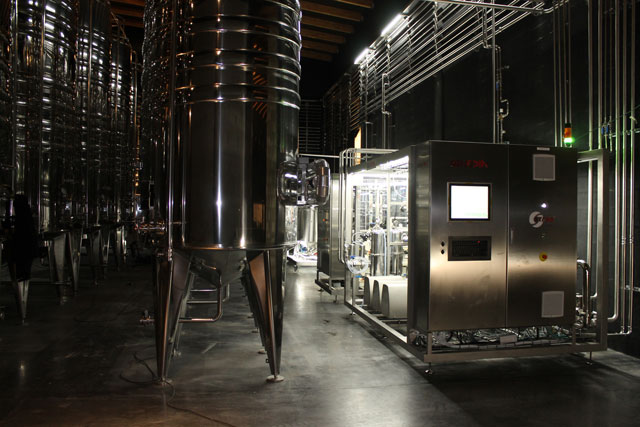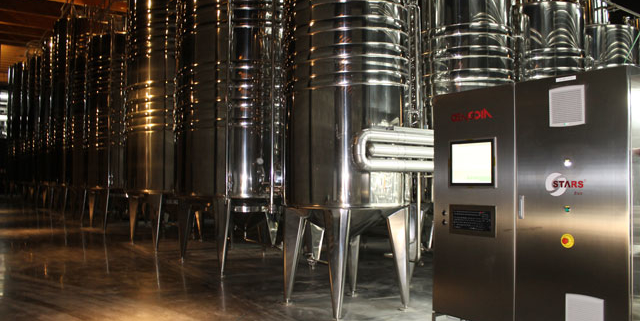Eco-selective stabilization at the service of quality-driven winemaking, respectful of both wine & environment
Let’s head to Catalan DO Penedès, where cava holds its own with its northerly big brother, champagne.

A Catalan self-made man
The family history of entrepreneur Pere Ventura, who recently turned sixty years old, is intimately enmeshed with the rise of winemaking and economic development in the Penedès region. The story goes back to the late 19th century, when Pere Ventura’s great-grandfather was working for the famous Catalan wine producer Codorniù. His employer traveled to Champagne where he learned the secrets of the traditional method of making sparkling wines: cava, the Catalan version of champagne, was born. In turn, Pere Ventura’s grandfather trained within the Moët & Chandon group, then founded Torreblanca, the family estate in Catalonia. Torreblanca was passed on to Pere Ventura’s father, then to Pere Ventura and his siblings. However, it is alone and after giving up the family inheritance that Pere Ventura embarked on the creation, “ex nihilo”, of his own winemaking project, driven by a strong personal vision and an international ambition. That was 1992. 29 years later, Pere Ventura Wine Estate is a group of 3 Catalan estates, employing more than 100 people on a 200 hectare-vineyard. Its turnover is over 20 million euros and its international fame is growing. 4 million euros are being invested to make its Sant Sadurní cellar a jewel of innovation and technology. Over 90% of production is exported; it has received recognition through many rewards. Through the success of Pere Ventura’s wines, it is also cava in general that comes into its own, on an equal footing with the hard-to-match champagne.
Demanding excellence & respecting the environment
Such a success is not the result of chance. On the contrary, it relies on a strong work ethic & sound foundations. Respect for the land is essential: the vines are cultivated according to the principles of organic farming. Human intervention is limited to what is strictly necessary. A cover crop- which naturally regulates vine vigor & captures CO2– is maintained if necessary. Sustainability & respect for the environment remain priorities at each stage of winemaking. The brand-new cellar and the equipment it holds have been designed, down to the smallest detail, in this sense. The project is designed to minimize water & energy consumption, as carbon footprint is monitored: for example; the cellar is mostly underground, so that its temperature is naturally suitable for storing the precious nectar, which also preserves the natural landscape. The winemaking approach is smart, sustainable, and well thought-out: the best technologies have been sourced with care, often inspired by the example of Champagne. Inputs and additives are limited as much as possible. In this sense, Pere Ventura’s wines are the fruit of a delicate balance: on the one hand, let the terroir speak for itself; on the other, gently and thoughtfully guide vines & wines to their best expression.

When modernity serves tradition
The Pere Ventura project shows that intelligent technology use makes it possible to keep traditional productions alive & growing while respecting both the environment and the consumer. STARS tartaric stabilization has thus naturally found its place in the winemaking process. Pere Ventura has borrowed the principle of optimal flow management from the industrial world, with very well-thought-out sizing of equipment. The complete automation of tartaric stabilization enabled by STARS fits this philosophy, and it was a key element in the investment decision. The low energy consumption of eco-selective stabilization, compared to the cold alternative, was also strategic. Of course, & above all, STARS allows the cellar to achieve its oenological objectives: the reliability of the technology makes it possible to avoid wine loss, gushing during disgorging & to guarantee tartaric stability for export, no matter how distant. The slight drop in pH that accompanies STARS stabilization is welcome, and helps mitigate the effects of climate change on the wines of this sun-basked region. This new STARS unit in Catalonia confirms the potential of the technology among producers of cava and sparkling wines in general.
Photos: STARS has been installed in a part of the winery that will be visible to tourists.



